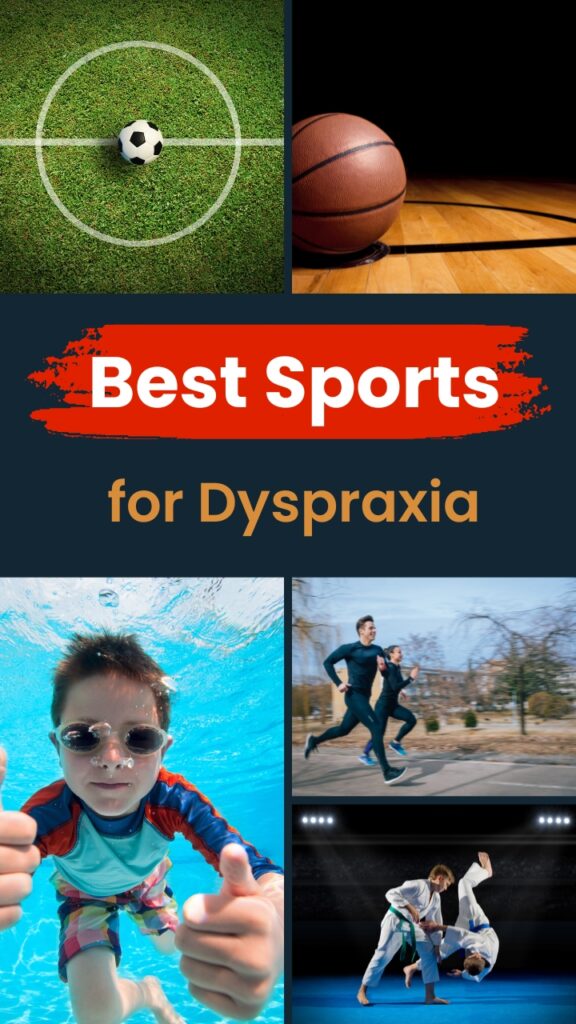Dyspraxia, also known as developmental coordination disorder, can present challenges with movement, coordination, and balance. However, sports can play a pivotal role in improving motor skills, boosting confidence, and fostering social connections for individuals with dyspraxia. The key is finding activities that are adaptable and emphasize enjoyment over competition.
Swimming, for example, is an excellent choice. It allows individuals to develop coordination at their own pace while minimizing the risk of injury due to its low-impact nature. Similarly, yoga helps improve balance and flexibility while promoting relaxation and body awareness. Both sports are not only therapeutic but also empowering, making them ideal starting points for individuals with dyspraxia.

Read also:
Best Sports for ADHD Kids: Boost Focus & Energy!
Understanding Dyspraxia
Dyspraxia, also known as Developmental Coordination Disorder (DCD), is a common disorder. It affects fine and gross motor skills. It can also impact speech. Children with dyspraxia may find it hard to plan and carry out physical tasks. But with the right support, they can thrive.
Why Sports Are Important for Kids with Dyspraxia
Sports can be great for kids with dyspraxia. They help improve motor skills. They build self-esteem. Sports also teach kids to work in teams. With patience and practice, sports can be very rewarding for children with dyspraxia.
The Best Sports for Children with Dyspraxia
Not all sports are right for every child with dyspraxia. It’s important to find the right fit. Here are some sports that can be beneficial:
Swimming
Swimming is a top choice. It’s gentle on the body. It helps with coordination. The water offers resistance. This resistance helps build muscle. It also helps with joint awareness. Swimming can be calming, too.
Gymnastics
Gymnastics works on balance and coordination. It strengthens the body. Kids learn routines, which helps with memory. Gymnastics classes can be adapted for different abilities.
Martial Arts
Martial arts focus on control and discipline. They can improve balance. They also help with self-defense skills. There are many types of martial arts. Some popular ones include karate and taekwondo.
Horseback Riding
Riding a horse can be very beneficial. It improves posture. It also helps with balance and coordination. Being around animals can be soothing for children with dyspraxia.
Athletics
Track and field can be a good option. Running helps with coordination. It builds endurance. Field events like long jump can be fun, too. They help with spatial awareness.
Team Sports
Team sports like soccer or basketball can be challenging. But they can also be very rewarding. They teach kids about teamwork. They also help with social skills.
Finding the Right Sport for Your Child
Every child is different. It’s important to find a sport that fits your child. Look for inclusive programs. They should offer support and adapt to your child’s needs. Always talk to your child. Find out what they enjoy.
Tips for Success in Sports for Kids with Dyspraxia
Success in sports comes with support and the right approach. Here are some tips:
- Start slow and be patient.
- Focus on fun, not just competition.
- Give clear instructions and demonstrations.
- Use visual cues to help with learning.
- Praise effort, not just success.
- Be supportive and encouraging.

Credit: www.reddit.com
Encouraging Participation in Sports
Getting kids with dyspraxia into sports can be tricky. Make it fun and stress-free. Celebrate small victories. Encourage them to try different sports. This helps them find what they like best.
Benefits Beyond Physical Skills
Sports do more than just improve motor skills. They help with social interaction. They build confidence. They also teach kids about winning and losing. These life skills are valuable for children with dyspraxia.

Credit: www.littlecedars.co.uk
Frequently Asked Questions
What Are Dyspraxia-friendly Sports?
Swimming, martial arts, and horse riding are considered dyspraxia-friendly sports, offering structured movements that can improve coordination and balance.
How Does Exercise Benefit Dyspraxia?
Regular exercise, particularly sports that emphasize coordination, can significantly enhance motor skills and boost confidence in individuals with dyspraxia.
Can Team Sports Help With Dyspraxia?
Team sports like soccer or basketball may be challenging but can be beneficial for social skills and strategic thinking when adapted for dyspraxic individuals.
What Individual Sports Are Good For Dyspraxia?
Sports such as athletics, golf, and cycling allow individuals with dyspraxia to pace themselves and focus on personal skill development.
Conclusion
Finding the best sport for a child with dyspraxia can be a game-changer. It can help them in so many ways. It’s not just about getting better at sports. It’s about building a happier and more confident child. So, take the time to explore different sports with your child. Find the one that lights up their world. And remember, the best sport is the one they enjoy the most!
Are Stick Sports a Good Option for People with Dyspraxia to Improve Coordination?
Stick sports can be a valuable tool for individuals with dyspraxia to enhance coordination and motor skills. The repetitive movements and focus required promote physical development and spatial awareness. The benefits of playing stick sports also include improved hand-eye coordination, increased confidence, and a fun way to stay active while overcoming challenges.
Final Thoughts
Children with dyspraxia can achieve great things in sports. With support and the right environment, they can excel. They can make friends. They can build skills that last a lifetime. So, let’s get moving and find the perfect sport for your child today!
